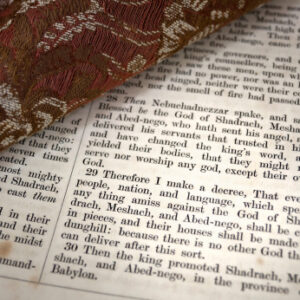
This year I’m doing something I’ve never done: I’m reading the entire Bible through in historical order, the order the events in the Bible happened, not when they were written.
It’s been a fascinating journey, one that has enabled me to see things in the Bible I had never noticed. I made one such discovery last week in the Book of Daniel.
Daniel is a fascinating book for me because it describes broad swaths of world history. There is prophecy pertaining to the Babylonian Empire, the coming Persian, Greek and Roman empires.
There is mention of Nebuchadnezzar, Cyrus the Great and prophecies regarding Alexander the Great and Antiochus Epiphanes IV, major historical figures and objects of study for even secular historians.
It is in the context of this setting and description of historical world-dominating empires that something peculiar emerges regarding the coming kingdom of God.
The Book of Daniel essentially starts with the story of Daniel interpreting the prophetic dream of Babylonian emperor Nebuchadnezzar, which concludes with a description of the kingdom of God, “And in the days of those kings the God of heaven will set up a kingdom which will never be destroyed…it will itself endure forever.” (Daniel 2:44)
Later Nebuchadnezzar, after having an interesting encounter with God, praises Him and states in a written declaration, “His kingdom is an everlasting kingdom, and His dominion is from generation to generation.” (Daniel 4:3).
Then during the reign of Nebuchadnezzar’s successor, Belshazzar, Daniel has a vision, at the end of which he declares “His dominion is an everlasting dominion which will not pass away; and His kingdom is one which will not be destroyed.” (Daniel 7:14)
After that Darius the Mede ascends to the throne and seeing the miraculous delivery of Daniel from the lions’ den proclaims, “For He is the living God and enduring forever, and His kingdom is one which will not be destroyed, and His dominion will be forever.” (Daniel 6:26).
It’s almost as if God placed this repeating theme of the enduring nature of the kingdom of God in the midst of this book of great earthly kingdoms and rulers to make a point: All these earthly kingdoms, the greatest the earth has had to offer, ultimately were conquered by others, but the kingdom of God will never be left for another people and will endure forever. The Lord even has two non-Jewish earthly rulers proclaim this truth so that we don’t miss the point.
And there is one last point. The enduring nature of the kingdom of God is not merely a result of the promise of an afterlife, but it is a characteristic of the kingdom of God on earth. The kingdom of God has endured and will continue to endure, not only because it offers life after death, but before it. GS
